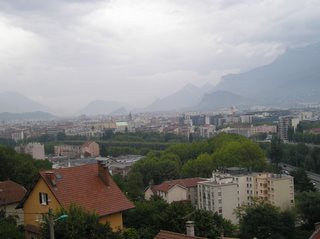 Well, here we are in France. Grenoble, to be exact. We got here on Friday about 1600H (4:00 PM local time, 9:00 AM Chicago time), got situated, and finally crashed after being awake for 40 hours.
Well, here we are in France. Grenoble, to be exact. We got here on Friday about 1600H (4:00 PM local time, 9:00 AM Chicago time), got situated, and finally crashed after being awake for 40 hours.
We did sleep on the plane, but it was like the Pharaoh who had his legs broken in order to fit in his sarcophagus. But, it did get us through.
It is really a beautiful area, and we have a great view from our flat, half way up the side of a mountain.
This picture is looking to the south-east out of our sitting room window. It was cloudy and hazy when I took the shot, but I like the effect. I almost can see Frodo and Sam making their way along the side of the mountains on the way to Mordor.
It's been a grand adventure, although most missiologists tell you never to think of working in another culture as an adventure. Maybe it is because an adventure is about the thrills and challenges that you have to face on your own, relying on your own resources. Most of that is true except the part about being on your own and relying on your own resources. There is always a certain confidence that I seem to enjoy when I know I'm following God where he is leading.
Our first Sunday was kind of a red-banner day, attending two english language church services, and partaking communion with both congregations. Everyone was absolutely marvelous. We have several invitations to lunch and such, and there is already much in the queue as well.
As I sat doing devotions this morning, a thought struck me as I read through Psalm 1. It was the word "Torah," or Law, as it is commonly (though mistakenly) translated. Torah is more like instruction or guidance. It resembles a road map for a journey that shows us landmarks and places of interest along the way. It is not a series of laws and pronouncements, restrictions or lists of "do's" and "don'ts" given to us.
Paul points out that the word of God (i.e., the Law) is for equipping the saints for every good work. If you read 2 Tim. 3:16f, you have more the idea of a journey than a set of guide lines and regulations: scripture shows us the path we should walk, let's us know when we get off the path, shows us how to get back on the path, and then how to stay on that path.
I think this understanding of the Law comes from a bad reading of both Paul and Luther. Luther said in his sermon on the gospel of Matthew:
The Law is that word by which God teaches what we shall do, as for instance, the Ten Commandments. Now, if human nature is not aided by God's grace, it is impossible to keep the law, for the reason that man since the fall of Adam in Paradise is depraved and full of sinful desires, so that he cannot from his heart's desire find pleasure in the law, which fact we all experience in ourselves.We get it right when we say, as with Luther, that God gives us his commands, which is Law. But where we get it wrong is that we think that this is all there is to it. Always with God's command there is also grace that transforms and changes human nature so that it is possible to keep the law and make us righteous before God. God never gives us a demand without giving us the ability to understand it and obey him. This is grace, or more properly, gospel.
The attempt to fulfill the demand of the Law outside the realm of grace is what we commonly think Luther refers to as Legalism (as does Paul, since he must of read Luther). But this is not legalism. Legalism is an overemphasis on the peripheries. The misunderstanding of both Paul and Luther (although Martin does blur the distinction from time to time) comes because we fail to see that the Pharisees tried to put a hedge around the Law, then kept books on everyone to make sure that they kept their sin and transgressions on the periphery of the hedge, and away from the Law.
As time went on, the breaking down of the hedges on the periphery was seen as heinous as breaking the Law itself. This is also why the Pharisees had long, drawn out discussions on what was work and what wasn't.
All of this to say that that Torah (law) refers to the way that God shapes the human soul. And as far as that path, verse six states the situation very clearly:
for the Lord watches over the way of the righteous, but the way of the wicked will perish.
The path desired by God is one where he watches over those who desire to follow him in their journey of faith, while an alternative is introduced with the word "but."
As always, it our choices that lead to our destiny.
And as such, Psalm one reads more like a love letter than a rule book.



0 comments:
Post a Comment